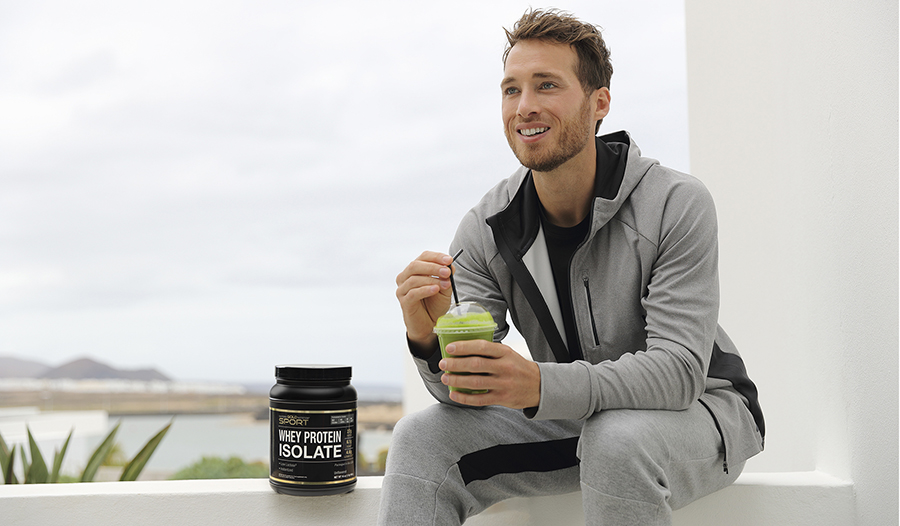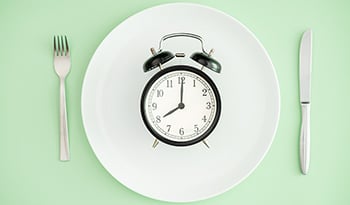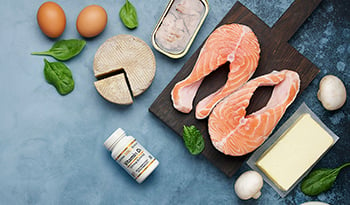3 Nutrition Myths That Need to Go Away…Forever

Over the last decade, both the science of nutrition and how we think about our own nutrition have changed a ton. Most of these changes have been for the better. With the boom of social media, we now have access to a wealth of quality, useful information to guide our pursuit of healthier eating and our approach to nutrition.
Despite social media putting inspiring and insightful nutrition information literally at our fingertips 24/7, there is room for improvement. As we all know, not everything posted on the internet is true. Some long-lived nutrition myths continue to float around the web because misguided sources continuously misconstrue nutrition science.
You’ve likely heard the following two nutrition myths before. Let’s explore these myths and put them into context so we can identify what is accurate and what we should ignore.
Myth #1: Eating at Night Equals Instant Weight Gain
The nutrition myth that eating at night leads to instant weight gain has been circulating widely for the last decade. While there isn’t a clear starting point for this nutrition myth, it may have evolved from certain studies and personalities that presented this topic as truth.
When big personalities in the nutrition sphere on social media speak definitively on a topic, it creates a bias in eating habits for others who may not understand the larger picture.
With that said, let’s discuss this nutrition myth and highlight what actually matters when considering the connection between meal timing and weight management.
The Reality
If your caloric intake is consistent and aligned with your daily caloric needs, then your meal timing doesn’t directly impact the amount of weight you gain or lose. For example, if dinner is your largest meal of the day and you, therefore, consume most of your daily calories in the evening, research suggests you wouldn’t gain weight simply due to the timing of your caloric intake.
We now know that weight maintenance is not a simple energy in/energy out equation. However, if you are consuming calories at around the amount you need for maintenance, your body has no inherent bias for when you should eat those calories—and you won’t gain weight just because you ate those calories at a certain time.
Whether you like consuming a larger breakfast or dinner, if your caloric intake aligns with your daily burn, then you shouldn’t stress too much about gaining weight from the timing of your meals.
The Bigger Picture
All of that said, eating habits can and do change at different times of the day. Let’s discuss a few examples in which nighttime eating actually can be counterproductive for some individuals’ goals.
One common example of counterproductive nighttime eating is mindless snacking at the end of the day while watching television or scrolling the internet. When we’re coming down from a busy day and having a nighttime snack, we often eat for reasons other than hunger and don’t pay attention to how much we’re consuming.
When we eat without paying attention to our hunger, we are more likely to consume more calories than we’ll burn, which eventually leads to weight gain. This is not isolated to the time of day in which we’re eating—it’s more a reflection of our eating habits, or how we eat, at the end of the day.
Another example of how eating later in the day can be counterproductive is when later mealtimes impact your sleep. Sleep is crucial for good health for many reasons, including hormonal regulation and metabolism.
Late meals that impact your ability to get a good night’s sleep can raise your levels of stress hormones and blood glucose. And research suggests that lack of sleep is associated with increased hunger and appetite, particularly for calorie-dense foods.
In this way, late meals can impact your body weight—not directly because of the time of day you eat, but because of how late meals impact your sleep, your food choices, and the awareness you bring to your eating.
Myth #2: You Have to Eat Directly After a Workout or You Miss Gains
The idea that you have to consume protein immediately following a workout has been perpetuated by supplement companies and sports nutrition “experts” for years. The beloved “anabolic window,” as it’s often referred to, is typically seen as a magical period of time in which protein is used for muscular repair and gain following a workout.
The anabolic window is not a myth—there are many benefits to consuming nutritious meals following tough workouts. However, the strict timeline often given for the anabolic window doesn’t paint the full picture.
The Reality
As you work out you deplete your energy stores, creating a need for nutrients to recover and build back what you lost during your training session. Following your workout, your body is primed to use the nutrients you consume to recover and grow more efficiently.
Each individual athlete has her own anabolic window or time during which they can double down on post-workout nutrition to optimize gains. But, generally speaking, this window is usually longer than what is claimed. The typical 30-minutes to 1-hour long anabolic window is an exaggeration—in reality, the window is much longer, often spanning multiple hours.
Recreational lifters and athletes will not lose gains if they don’t consume protein immediately after a workout. While optimal nutrition can certainly help with recovery and energy, your workout was not a waste if you consume a meal 2 to 3 hours afterward.
The Bigger Picture
Although the anabolic window is likely not the biggest deal for recreational lifters and athletes, it can be more important for individuals doing two-a-days or in scenarios when you need energy following a workout to perform your best.
Two great examples here are athletes working out multiple times a day and high-performing individuals who have super stressful jobs. In these contexts, a post-workout meal, protein shake or protein bar and carbs, or even dried fruit and nuts, can positively influence recovery and energy levels for tackling tasks later in the day. Someone who works out in the morning and afternoon has a higher demand for nutrients after their morning workout so they can perform strongly in their afternoon session.
Nutrition timing can matter, but the anabolic window following a workout is longer than what many suggest it is. For more casual lifters, the urgency of consuming is not necessarily a huge deal. Remember to take your individual needs into context when consuming post-workout meals and protein.
Myth #3: Breakfast Is a Must
Growing up, I’m sure you heard your parents say something along the lines of, “Eat your breakfast, it sets the tone for your day” or “it’s the most important meal.” This is a classic old-school way of thinking.
The idea that breakfast is superior to other meals isn’t rooted in science or context. And believing that breakfast is more important than other meals can create an unhelpful eating bias.
The Reality
Your breakfast and when you consume it, if you do, should be individualized per your wants, needs, and nutrition goals. Breakfast is not needed for making nutrition and body composition gains. If you’d rather skip breakfast and wait until later in the day to start eating, you can do so without losing out on any “potential” that often accompanies the idea of breakfast.
The reality is that as long you’re consuming adequate calories for your energy needs and goals by eating a nutritious, balanced diet, you do not need breakfast to make progress. In fact, some popular nutritional approaches, like Intermittent Fasting, are based on the premise that eating at any specific time of the day is not necessary.
The Bigger Picture
Just because you don’t need breakfast doesn’t mean it isn’t useful in some contexts. Let’s say you work out in the morning or have a super busy morning at work and need some food to perform at your best. In this context, eating a nutritious breakfast could help you be more productive and feel better throughout your morning.
If you like to train early in the morning, you may need post-workout nutrition to replenish your muscles and energy stores, and to be able to perform your best at work and with family and other responsibilities. This could be a full meal, protein shake, or meal replacement—whatever you prefer.
Eating breakfast may also help you make more nutritious choices later in the day. You know the saying, “never shop hungry?” When you go to the grocery store on an empty stomach you often end up coming out with items you never intended to purchase—and often ones that don’t fit with your nutrition plan.
The same can be true for skipping breakfast. For some people, not eating breakfast means they are ravenous by lunchtime, which can lead them to make less-than-healthy food choices at lunchtime and even later in the day. If you are one of those people, you may benefit from a nutritious, protein-rich breakfast.
The takeaway point here is that breakfast is not a magic meal. But that doesn't mean it can’t be useful for people who need an energy boost in the morning, need to replenish and recover from an early workout, or who tend to make poor nutrition choices when they get overly hungry.
Key Takeaways
When you hear nutrition advice that is extreme or definitive in nature, remember to consider the bigger picture. Many nutrition myths are started because of a poor understanding or narrow view of context. Be a critical consumer of nutrition advice. Nutrition, eating habits, and how we navigate food in our daily lives are all individual.
Use and reference nutrition information that is based on sound science, question advice that is extreme, and always try to apply research-based nutrition information in a way that is realistic to your personal nutrition needs and desires.
DISCLAIMER:This Wellness Hub does not intend to provide diagnosis...
















































































 Table of Contents
Table of Contents
















